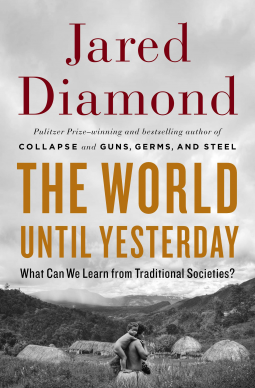
The World Until Yesterday
What Can We Learn from Traditional Societies?
by Jared Diamond
This title was previously available on NetGalley and is now archived.
Send NetGalley books directly to your Kindle or Kindle app
1
To read on a Kindle or Kindle app, please add kindle@netgalley.com as an approved email address to receive files in your Amazon account. Click here for step-by-step instructions.
2
Also find your Kindle email address within your Amazon account, and enter it here.
Pub Date Dec 31 2012 | Archive Date Feb 28 2014
Penguin Group USA | Viking Press
Description
Traditional societies-pre-industrial, low-density, non-state cultures-truly encapsulate the world of just "yesterday." Homo sapiens progressed past hunter-gatherer societies only 11,000 years ago, a mere tick of the second-hand in evolutionary terms, and although modernization has taken us far away from this primitive mentality, our bodies and social and familial practices are often better adapted for these traditional ways of life. Because of this, Diamond urges us to reexamine our contemporary system of values and way of life in order to distinguish some of the advantages that traditional societies enjoy when it comes to conflict resolution, care of elders and children, management of risks, multilingualism, and nutrition.
With his unique blend of anthropology, sociology, and evolutionary biology, Diamond paints a picture of our past that is startlingly different from the way we live today, but entirely relevant and with much to offer for improving our lives and our world. Focusing especially on how we can improve contemporary society by learning lessons from the past, Diamond's message is both urgent and persuasive: with some sincere thought and effort, there is still time for us to have the best of both worlds
THE WORLD UNTIL YESTERDAY draws from the kind of wide-ranging research that Diamond is best known for as well as from his own personal observations in the field. We are also privy to some of his most exciting stories: his terrifying, near-death experience when his boat capsizes off the coast of Indonesian New Guinea, the mysterious and recurring illness he experiences when studying birds in the New Guinea Highlands, and instances of the "constructive paranoia"-the extreme cautiousness that is essential to the survival of traditional people-that he witnessed among the New Guineans and eventually came to deeply appreciate.
ABOUT THE AUTHOR:
Jared Diamond is a professor of geography at UCLA. Among his many awards are the National Medal of Science, the Tyler Prize for Environmental Achievement, Japan's Cosmos Prize, a MacArthur Foundation Fellowship, and the Lewis Thomas Prize honoring the Scientist as Poet, presented by the Rockefeller University. His previous books include Why is Sex Fun?, The Third Chimpanzee, Collapse, and Guns, Germs, and Steel, winner of the Pulitzer Prize.
Available Editions
| EDITION | Hardcover |
| ISBN | 9780670024810 |
| PRICE | $36.00 (USD) |
| PAGES | 512 |



